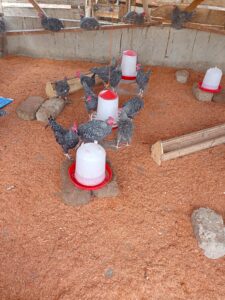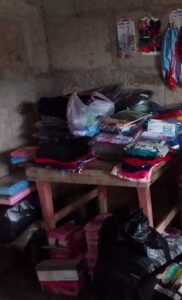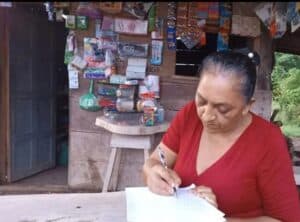
A Headmaster Sees the Change Brought by the Teen Girls Club
By Bridget Gyamfi – National Builder’s Corps (NABCO) Member

The school’s headmaster working with the girls.
Nkontomire is a small community located in the Atwima Nwabiagya Municipality in the Ashanti Region of Ghana. It is about 40 kilometers from Kumasi with a population of approximately 500 people. It is a rural community with basic social amenities such as safe drinking water, electricity, and a school. Most of the people are into farming; they cultivate large quantities to feed their households and also for commercial use. Some people are also into cash crop farming such as cocoa. Due to the great contribution the community makes to the agricultural sector, it has attracted many community development interventions from non-governmental organizations such as Solidaridad, MOPCCA, and Self-Help International.
One of the active interventions in the community is Self-Help’s Teen Girls Club which was introduced in 2017. The club is focused on young girls, and its main purpose is to help teen girls achieve academic success and go on to senior high school. The club also teaches skills for girls to support themselves and lessons in self-esteem.
Nkontomire M/A primary school is a government school headed by Headmaster Ernest with about 350 students, 55 percent of which are girls. It lacks adequate reading materials, computers and other learning equipment. The headmaster is an advocate for the school’s development, so he has encouraged his students to join the Teen Girls Club. He has also given Self-Help an opportunity to meet club members for reading practice and other lessons at the school.
When the club began, the girls were challenged in many ways. Nearly all of the club members could neither read nor construct simple sentences as a result of the school lacking reading materials to teach properly. Also, girls’ enrollment was decreasing because most of the girls lacked information on what to do during menstruation. During their periods, some did not go to school at all while others sought permission to go home. Personal hygiene was another issue the girls faced. They had low self-esteem and confidence. Most of them were too shy to ask questions during meetings or in class.

Teen Girls Club members.
Despite the challenges that could have hindered the girls, they understood what the Teen Girls Club was about and were committed from the start. As part of the program, Self-Help provided the school with standard reading materials to enhance the girls’ reading and writing skills. Life support skills and other training, such as self-esteem, goal setting, personal hygiene, reproductive health, etc. were added with the hope that these lessons would change their lives. They developed the habit of reading and started making progress in class. This encouraged the headmaster and three other teachers from the school to volunteer to teach the girls after school hours.
Now, the ‘old’ girls are gone and a great change is here. Almost all of the girls are able to read and write. They understand their menstrual cycle and do not miss school during it. Participants have higher self-esteem and confidence, and nonmembers are feeling inspired to join the group.
The headmaster expressed his profound gratitude to Self-Help, noting that the intervention has indeed created more awareness of girls’ issues at the school, increased girls’ enrollment, provided reading materials for the school, and created structure and discipline for the girls. Everyone at the school involved with the Teen Girls Club program would like to convey their appreciation for the great impact and support.

 Previous Post
Previous Post Next Post
Next Post


